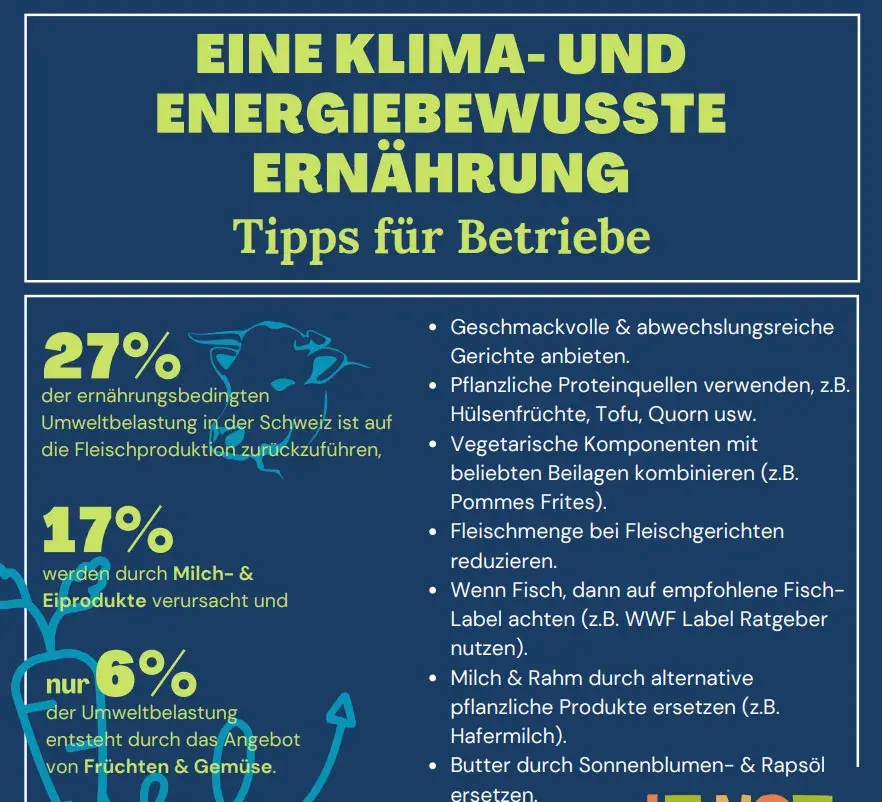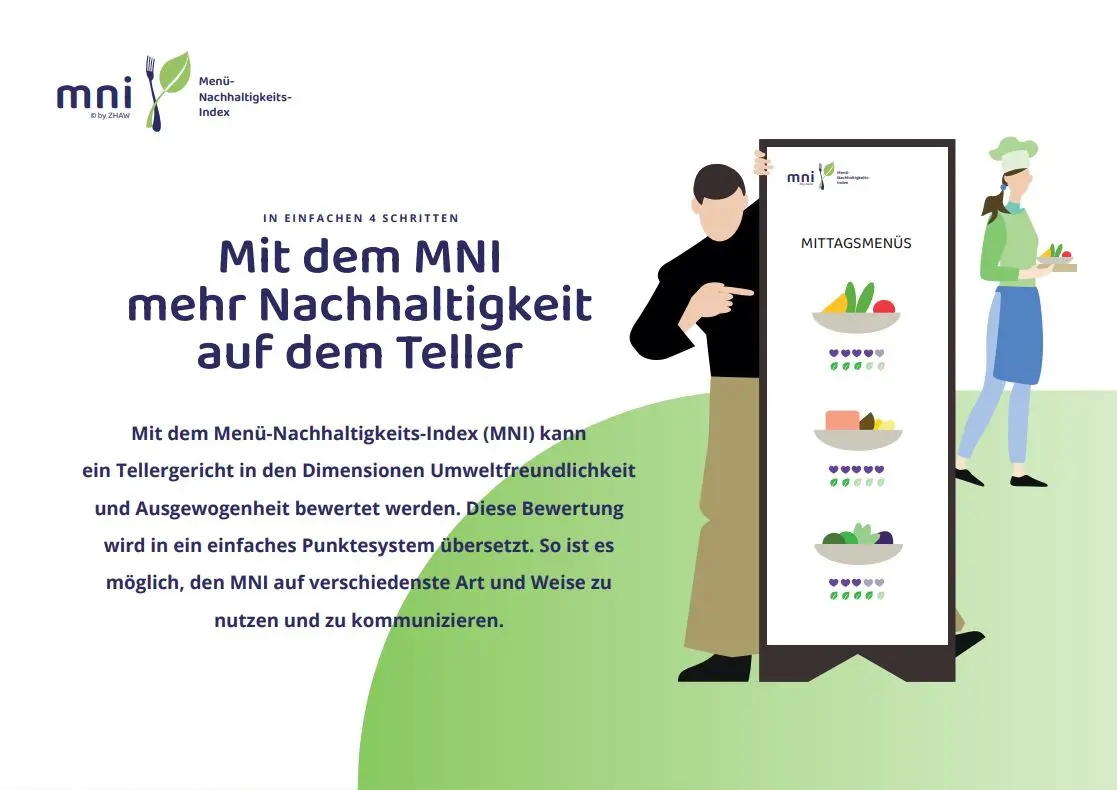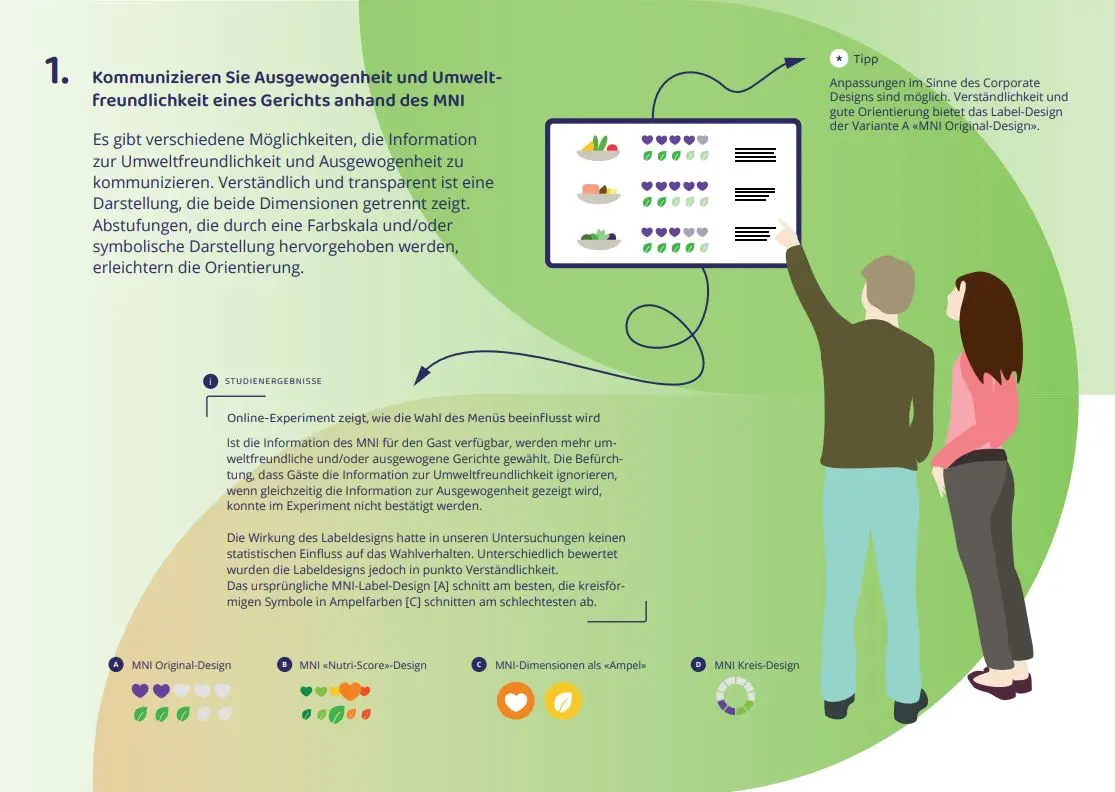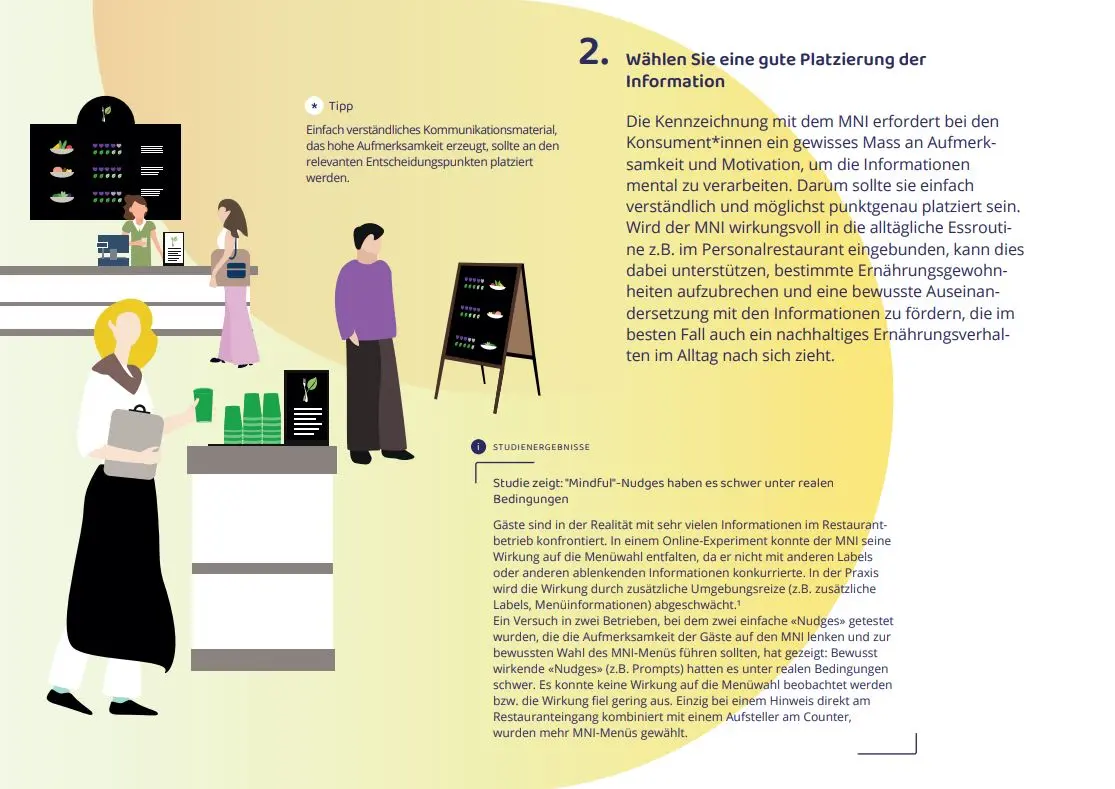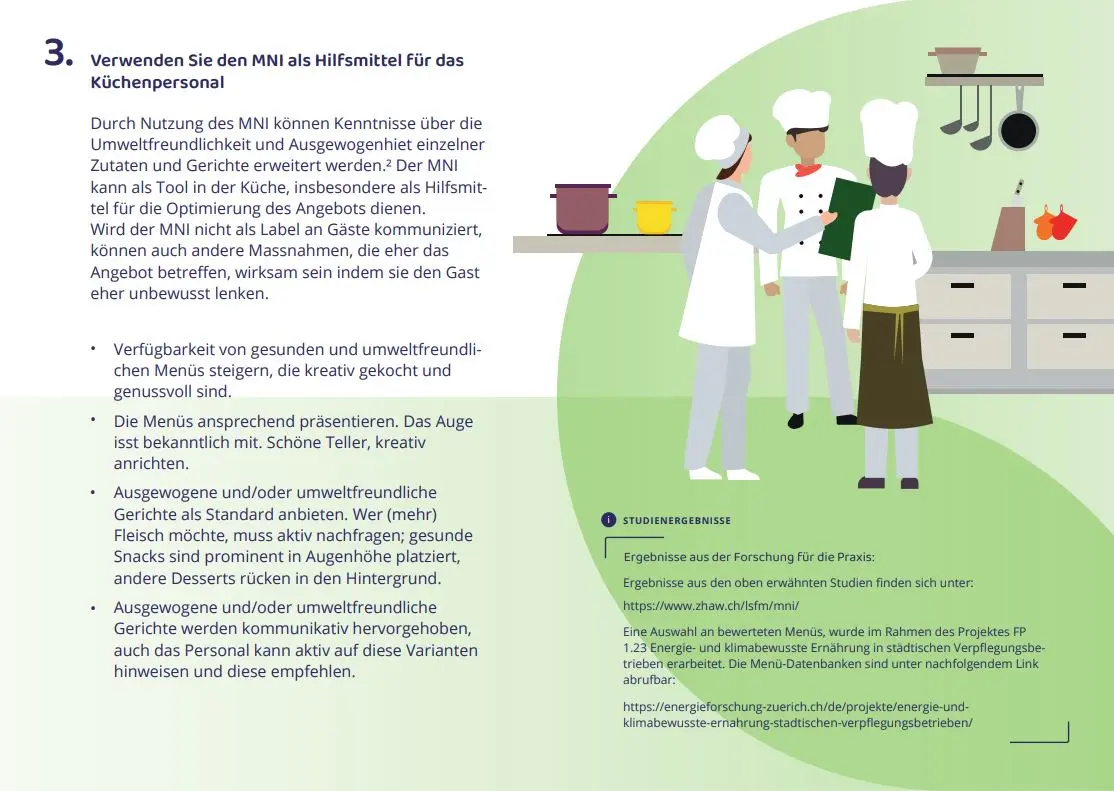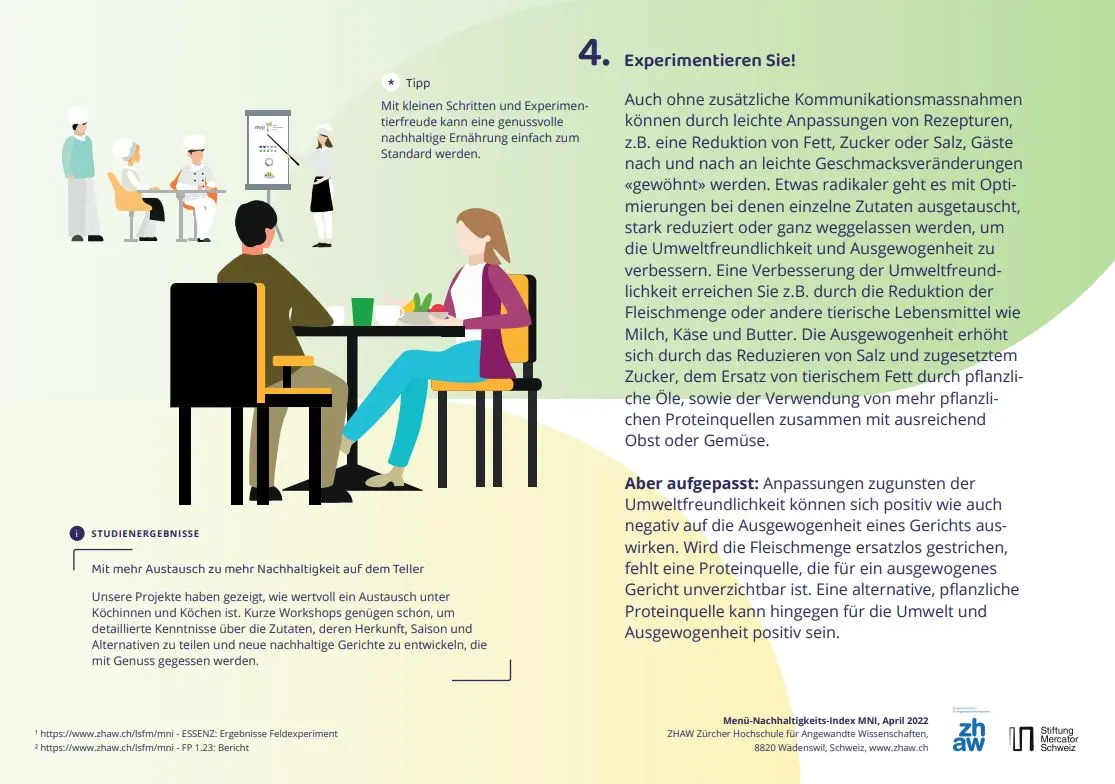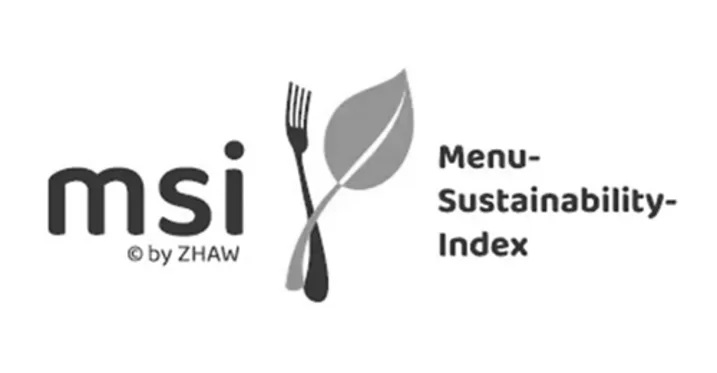The Menu-Sustainability-Index – An Assessment Tool for Cafeteria Catering
In order to make sustainable nutrition a more integral part of community and company catering, it's essential to have reliable and simple, yet scientifically validated tools, such as the Menu-Sustainability-Index (MSI) from the Zurich University of Applied Sciences (ZHAW).

The Menu-Sustainability-Index
In Switzerland, food is available around the clock - and there is plenty of it. The global food system allows us to include absolutely everything in our diet, regardless of the season or distance. However, our unrestricted access to food results in the consumption of an enormous amount of resources: around 28% of Switzerland’s environmental impact can be attributed to our eating habits. Moreover, our health is closely linked to what we eat. In Switzerland, diet-related diseases and the costs associated with treating them are steadily increasing.
According to the national nutrition study menuCH, 50% of Swiss people surveyed choose to eat outside of their homes during lunchtime. With the push towards achieving the 2000-watt goal and new requirements for public tenders, communal catering businesses such as staff restaurants and cafeterias are facing new challenges to satisfy their customers' needs. The MSI can be a useful tool for these businesses, allowing them to create a catering offer that meets not only the taste preferences of their guests, but also the requirements of preventive health and environmental sustainability.
The MSI …
- allows meals (excluding beverages and dessert) to be assessed in terms of sustainability aspects for environment and health (from a nutritional perspective).
- provides a comprehensive measurement of a menu's environmental impact through a single characteristic value called "eco-points" (EP). This value is calculated by taking into account all of the environmental impacts of the meal ingredients throughout their lifecycle, including cultivation, transportation, storage, processing, and sale of the products.
- defines the nutritional balance of a meal in so-called "nutritional balance points" (NBP). These points result from the energy content, the proportion of fruit and vegetables and the deviation of certain nutrients from the recommended reference values.
- helps kitchen managers & chefs optimise menus for environmental sustainability and nutritional balance with ease.
- can be integrated for use into existing inventory management systems.
- can be customized to the provider's preferences in terms of communication and design.
- provides guests with additional information to make environmentally friendly and nutritionally balanced meal choices.
KlimaKochlernende – More Sustainability in the Training of Cook Apprentices

The KlimaKochlernende project strengthens sustainability as a key cross-cutting competence in the training of cooks (EFZ) and kitchen assistants (EBA) in Switzerland. To this end, the digital learning tool WIGL is being further developed: The existing recipe database is being expanded to include environmental and health aspects based on the Menu Sustainability Index (MNI) and supplemented by an AI-supported chatbot that suggests menu and ingredient alternatives. In addition, new learning units based on the principles of transformative learning are being created to convey sustainability in a practical and interactive way.
This enables trainees to design dishes that are tasty, balanced, and environmentally friendly. The overall aim of the project is to embed sustainability permanently in basic vocational training – without restricting culinary diversity.
Green Betty – Making sustainability visible on the plate

Green Betty is a joint project by Betty Bossi and the ZHAW that makes the environmental impact of recipes transparent and promotes sustainable everyday cooking. The assessment is based on the Menu Sustainability Index (MSI), which automatically calculates the environmental impact of meals and displays the results directly within the digital recipes. This provides users with clear guidance on the environmental compatibility of their dishes and enables them to choose seasonal, resource-efficient and environmentally friendly recipes.
A scientifically grounded system was developed for the evaluation: the five-point Green Betty Scale. Its calculations rely on the Ecological Scarcity Method, which captures environmental impacts across the entire life cycle of food products. To date, around 3,000 meals have been assessed using this system. The results illustrate how strongly everyday cooking decisions influence environmental burdens, without requiring compromises in taste or culinary diversity.
MSI - Environmentally friendly and balanced catering at the HSG (Pilot project June 2022 – February 2023)
The University of St. Gallen (HSG) has made a commitment to achieving climate neutrality by 2030, which includes optimizing the environmental sustainability and health value of its on-campus catering services. As part of this effort, a pilot project tested the use of the Menu Sustainability Index (MSI) at the Sapelli Mensa.
Project objective: Promoting sustainable catering on campus through the introduction of MSI
Project content:
- Three-phase pilot: The MSI will first be tested on three meal lines without any communication measures. In an intermediate phase, it will be tested with advance notice with three additional meal lines, and communication measures will be implemented (identification of health and environmental value by means of symbols, background information).
- In the third phrase, guests who participated in the first and second test phase will be surveyed to analyse their acceptance and the impact of the MSI and its communication.
- The project will also involve interviews with selected persons in charge of meal planning and production to evaluate the process.
- The project will conclude with a final report that summarises the balance of CO2 equivalent savings through meal adjustments, as well as recommendations for communication and their implementation.
Results - Key points:
- Less meat: Menus with a high proportion of animal products (meat, cheese, milk/cream) have a significantly higher environmental impact than menus with a high proportion of plant-based products. Therefore, the proportion of animal products in the dishes was reduced in menus that were rich in meat and animal product, with consumption dropping from 78% to 53%.
- One tonne of CO2e saved per week: By simply optimising the menu offerings using the MSI, a total reduction of 3.1 tonnes of CO2e was achieved within 3 weeks. This corresponds to a CO2e reduction of around 23% compared to the standard offer.
- Potential for further reduction: The environmental impact of the optimised food service offer was concentrated on a few menus: 27% of the total CO2e was caused by just 4 menus (= 11% of all menus sold). If these menus were removed from the offer, additional CO2e could be saved.
- Balanced dishes: Although this aspect was not the focal point of the study, the menu optimisation also led to an improvement in terms of the nutritional balance.
- "It matters": 70% of the surveyed guests stated that eating environmentally sustainable food matters to them. The result for eating healthy food was 90%.
- "What will I have?": At a buffet, the two aspects that decide whether or not a menu is chosen are "This looks appetising" and price. Although some people may identify as vegan, vegetarian, or meat/fish eaters, this alone does not conclusively explain how they make their choices. Visual appeal and cost can also convince meat and fish eaters to try more environmentally sustainable menus.
- On the MSI concept: 80% of those who participated liked the MSI menus and would choose them again. More than half (60%) found a comprehensible rating like the MSI helpful. Likewise, the vast majority found the MSI symbols, leaves for eco-friendliness and hearts for balance, intuitive and helpful.
- The kitchen gives it a thumbs up: People involved in the planning, production, and kitchen area support the project because it is very easy to implement.
What's next: Following the successful completion of the project with considerable savings, Migros has decided to continue its collaboration with the ZHAW and to use the MNI as a fixed component for the evaluation and labeling of its menu offerings.

"In collaboration with the ZHAW, we are using the MSI to test whether changes in our menu offerings alone or in combination with appropriate communication measures can effectively reduce the environmental impact of our cafeteria."
Patrick Schubiger, Head of Sales and Projects Community Catering, Migros Cooperative Eastern Switzerland, November 2022
Farm to Table - culinary research project of the ZFV companies, the ZHAW and the ZHDK (October 2023 - November 2023)
The ‘Farm to Table’ project, an initiative of the ZHAW, ZHdK and ZFV, explored the conversion of the canteen offer to sustainability with a comprehensive approach that includes seasonal, regional and balanced nutritional options. This four-week project was carried out on the Toni-Areal campus and included a detailed assessment of the environmental impact, nutritional content and customer acceptance, with a particular focus on the switch to a ‘Planetary Health Diet’.
The project was a complete success: by optimising the menu offerings, the average carbon footprint per menu was reduced by around 37% from 1.48 kg CO2-eq to 0.93 kg CO2-eq, with further savings potential. Compared to the reference offer, around 6 tonnes of CO2-eq could be saved.
The full report is available here.
FP 1.23 Energy- and climate-conscious nutrition in urban catering establishments
As part of the "Sustainable Food City of Zurich" strategy, the city has set a goal to reduce the environmental impact of food by 30% compared to 2020. One significant area that can contribute to achieving this goal is the food offered in city catering establishments. The food should not only be environmentally friendly, but also taste good and provide guests with the necessary nutrients and energy. To achieve this, businesses need to find ways to offer environmentally friendly and balanced food, while also considering measures that can support consumers in making sustainable choices. As part of the City of Zurich Energy Research program, the ZHAW research team developed a "menu library" that caters to the needs of guests at municipal staff restaurants and residents of retirement centers. This library can be an effective tool for achieving the city's environmental goals by providing tailored options for guests that are both sustainable and nutritious.
Results:
- The full report in German is available here.
- Further information on the Energy Research Zurich programme, with a focus on nutrition, can be found here.
- Tips & Tricks for businesses Factsheet (German) (PDF 436 kB)
- Presentation DGE-Congress 2022 (German) (PDF 1.18 MB)
- Poster DGE-Congress 2022 (German) (PDF 466 kB)
- KOCH ODER SPIEL – A set of cards for an energy and climate-conscious diet. 3 games, 32 cards, 32 menus and lots of good tips for delicious and balanced cooking. You can find the menus HERE.
Food choices for the future
A follow-up project, ESSENZ identified which measures could lead to environmentally friendly and balanced nutritional choices. The aim of this project was to develop communication measures which could be implemented in practice and are effective on the guests. The measures were intended to consider various influencing factors (including situational factors, habits) that play a role in the decision-making process, and to produce a more conscious menu decision that results from the guests' engagement with the information on the Menu Sustainability Index (MSI) and the topic of sustainable nutrition in general.
The project not only aimed to introduce measures that address decision-making in the company, but also to explore how these measures can encourage the adoption of sustainable nutritional behaviour in everyday life.
The project was supported by the Mercator Foundation Switzerland.
Results:
The "ESSENCE" of the results was presented at the DGE Congress 2022 in a poster session.
- Results from the online experiment (German) (PDF 2.25 MB)
- Results from the field experiment (German) (PDF 3.75 MB)
- Poster DGE-Congress (German) (PDF 382 kB)
- Infographic project results poster (German) (PDF 1.27 MB)
- Infographic project results single pages for printing (German) (PDF 1.46 MB)
If you have any questions, please do not hesitate to contact us.
Food for the future
The MSI was further developed and tested in practice for its applicability in the "Essen für die Zukunft" project, in collaboration with ZFV-companies, one of Switzerland’s largest catering, hotel and bakery groups
The project was supported by the Mercator Foundation Switzerland.
Project content:
- Further development of the calculation models
- Validation by nutrition experts from the Swiss Society for Nutrition (SSN) and the Swiss Federal - Commission for Nutrition (CFN)
- Integration of overfishing in the life cycle assessment
- Linkage with commodity management system
- Preparation of training material and implementation of training
- Development and testing of guest communication strategies
The MSI is currently being used in ZFV operations and has been integrated into the existing menu guidance system.

"Since its foundation, promoting conscious and sustainable consumption has been an important concern of the ZFV. Transparency is a key factor in achieving this goal. With the MSI, we offer the guests in our cafeterias and personnel restaurants a scientifically proven and practical tool to aid in their menu selection, without compromising on their culinary enjoyment."
Nadja Lang, CEO of ZFV-companies, 2021
Towards more sustainability & transparency in menu offerings with the MSI!
Would you also like to use the MSI, do you have questions about its implementation, or do you have a project idea that could further develop the MSI in collaboration with us?
MSI User Workshops
After adopting the MSI, it is important to understand its background and relevant parameters for menu optimisation, as well as to be able to provide information to interested guests. Corresponding training material is available. To support kitchen staff in these efforts, we also offer customized training sessions and workshops, tailored to their specific needs. Our team provides advice and support on how to use the MSI effectively and integrate it into existing menu guidance systems.
More project reports and publications (Mostly German)
- Interventions to promote climate-conscious nutrition, Ernährungsumschau 10/2022
- Project conclusion, presentation of 9.8.2018 (PDF 2.12 MB)
- The Menu Sustainability Index: Assessment basis and communication approaches, publication
- "Informational Nudges" to promote sustainable dietary behaviour in community catering (GG) - A field experiment, DGE Congress 2018 (PDF 501 kB)
- The Menu Sustainability Index, Ernährungsumschau 11/2016
- The truth on the plate, ZHAW Impact 39/17, page 50
- Wink Conference Presentation (PDF 1.52 MB)
